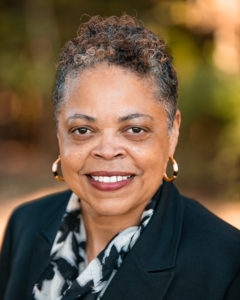Take One Step at a Time, Please

by Tawana Ford
As an adult student, seeking a General Equivalency Degree (GED®) and an Integrated Education and Training (IET) certification simultaneously is a rather lofty challenge. Stepping up to reclaim academic credentials while working and balancing a family is a considerable task for any adult learner but particularly for those who have statistically underperformed in primary and secondary school. Broad circumstances such as poor attendance, disciplinary actions, uninterest in school, or home environment contribute to why students don’t earn a high-school diploma; but I believe everyone deserves a second chance. While the many barriers to why students don’t graduate still exist, our adult education program stands as a foundation to ensuring individuals are able to learn industry skills and be connected to opportunities of employment while earning an academic credential.
In the Spring of 2020, Isle of Wight County Schools Adult Education program launched its first IET Welding Program. Ten students enrolled in this ten-week learning program where they learn the fundamentals of welding from one of our Career and Technical Education teachers and are academically supported by faculty members from Isle of Wight. In this genesis cohort, two students did not have a high-school diploma and needed to obtain their GED® credentials—the learning framework in the design of the program allows this to be achieved.
With high anticipation from both students and staff, the first welding class began a month into the second school semester for the district. Just as any educational institution, students came in with a variety of welding and academic experience. Some had no experience in welding while others had previous experience but were seeking to earn a certification to aid in upward mobility as a professional. Collectively, they made our first welding class unique, as the spectrum of individuals would bring diverse perspectives to the group. The desire to become industry certified in welding meant different things to each of them but the true value of this learning experience is salient in the development of a particular skill and being connected to viable employment. Importantly, the academic journey of each student was accented in the two students preparing for their GED® credential.
As the national, mandatory quarantine measures took effect in March, school doors across the nation closed for two weeks. To help save countless lives, the decision to cancel physical attendance to learning institutions paused learning for most students in Virginia and took a toll on our newly enrolled adult learners. The learners enrolled in GED® courses and the welding certification course grappled with the disjunction in their learning schedule and ultimately had a regressive response to the untimely changes.

The unprecedented move initiated a wave of school districts to pivot towards asynchronous, virtual learning—including ours. As a result, students are still recovering academically from the setback but are still on the path to GED® attainment and being certified. As COVID-19 uncovered resource disparities among our students, our adaptations required us to provide some of the students with laptops to access the online supplemental learning programs to continue learning.
While we all value efficient retention programs, there is much to be considered when educating adults who come from diverse backgrounds. With our adult education program, like many others offering a GED® program in conjunction with a professional certification, administrators must be diligent in understanding the needs of each learner. Our two students enrolled in both programs had difficulties completing assignments in the programs they less favored. For students like them, taking one step at a time promotes academic and professional success.
As we normally do in the adult education landscape, we look at data to inform how we teach and build relationships with our students. I vehemently recommend to other program managers that offer programs parallel to this design that they should identify and place students in respective programs based on their strengths and needs. I prescribe that if the student is stronger academically, then work on the GED® first to uplift the successes. Conversely, if the student has a skillset already in place for the certification program, then pursue the certification program first. Both are methods to help the student progress as well as appealing to the social emotional aspect of being motivated to complete each program. Be cognizant of the students’ strengths, seek some success first, then take the next step.
 Tawana Ford is Coordinator of Adult Education, Truancy, and UPLIFT in Isle of Wight County Schools. This is her third year as program manager and her twenty-ninth year as an educator. She LOVES seeing students enjoy learning and growing.
Tawana Ford is Coordinator of Adult Education, Truancy, and UPLIFT in Isle of Wight County Schools. This is her third year as program manager and her twenty-ninth year as an educator. She LOVES seeing students enjoy learning and growing.